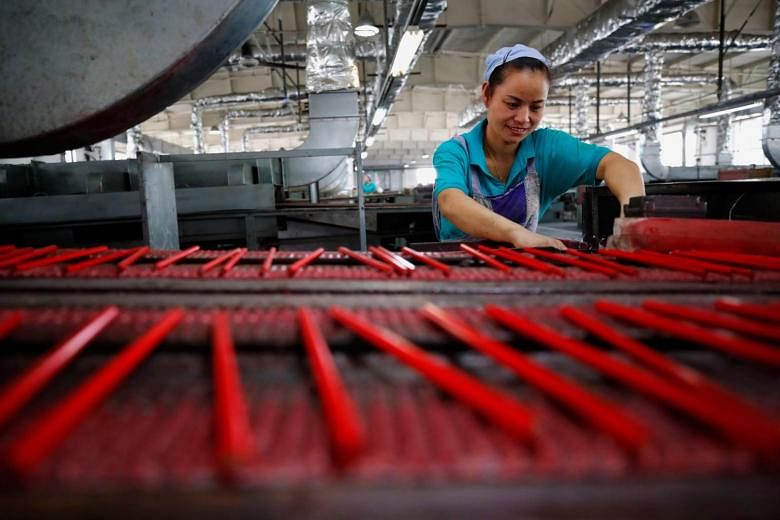The loss of domestic manufacturing due to higher US tariffs has been limited and has not adversely impacted the economy, China's industry regulator has said.
While China has indeed seen some businesses shifting their operations to neighbouring countries such as Vietnam, Vice-Minister for Industry and Information Technology Xin Guobin told reporters that the exodus has so far been more negligible than media reports suggested.
Separately, the Ministry of Commerce confirmed yesterday that United States and Chinese trade negotiators will meet in Shanghai next Tuesday and Wednesday for the next round of trade talks, their first face-to-face meeting since US President Donald Trump and his Chinese counterpart, Mr Xi Jinping, agreed at the Group of 20 summit in Japan to revive discussions.
The announcement came days after Xinhua news agency reported that Chinese importers had met officials to discuss buying US farm products such as soya beans, and had applied for tariff exclusions.
Commerce Ministry spokesman Gao Feng said that some Chinese firms have indicated a willingness to buy US agriculture goods and would be signing commercial contracts soon. But the resumption of trade talks had no direct bearing on these purchases, he added.
On manufacturing outflows, Mr Xin used data from Guangdong to show the minimal economic impact so far.
A total of 588 foreign-funded manufacturing companies reduced their presence in the southern Chinese province last year in lieu of new operations in countries such as Vietnam, Thailand and Malaysia, but they represented just 1.44 per cent of all foreign-funded firms, said Mr Xin.
In the same period, foreign firms made more than 1,900 new investments in Guangdong. This was particularly the case in high-end manufacturing by companies such as Foxconn, ExxonMobil and BASF, a German chemicals producer.
Vietnam has widely been seen as the main winner from the US-China trade war, which has seen the US slap 25 per cent tariffs on some US$200 billion (S$273 billion) worth of Chinese imports.
Vietnam has drawn record levels of foreign direct investment in recent years: The US$16.7 billion it attracted in the first five months of this year represented a year-on-year growth of nearly 70 per cent, which Hanoi's Foreign Investment Agency said was a four-year high.
Vietnamese exports to the US also soared 36 per cent in the first half of this year, prompting Mr Trump last month to threaten tariffs on such goods.
Mr Xin said that companies' practice of shifting production to countries with lower costs is normal and in line with market rules.
"Industrial transfer is a normal part of a country's industrial development, and there is no need to make a fuss about nothing," he said.
China is confident of achieving its industrial growth target this year of 5.5 per cent to 6 per cent, he added, noting that industrial output in the first half of the year reached 6 per cent, exceeding earlier forecasts.
Ministry of Industry and Information Technology spokesman Huang Libin said this was because Beijing had taken effective measures to mitigate the potential fallout from the US-China trade war, such as through targeted tariff exclusions and by giving tax cuts to semiconductor firms possibly caught in the crossfire.
Beijing would continue to formulate industrial policy to promote domestic capabilities in core technologies, while enhancing the ability of its industrial system to withstand shocks, he added.
"We will implement a series of policies related to tax and fee reduction for enterprises, so as to guide the orderly optimisation of industrial structure," said Mr Huang.

